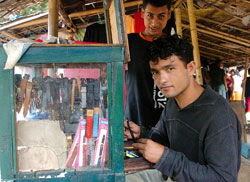|
|
| NO HOME AWAY FROM HOME: Naramaya Tiwari, 70, remembers the large fields and cattle her family owned in Bhutan. Here in camp, she has to compromise on food, clothing and all other basic needs. |
The government feels such resettlement would set a dangerous precedence for other regions to evict Nepalis and get away with it.
The refugees themselves have mixed feelings, but here at the Khudunabari camp in Jhapa secretary Manoj Rai claims that fewer than 15 percent of the more than 14,000 refugees agree with third-country resettlement, the rest see Bhutan as their ultimate destination.
We asked 24-year-old Thalimaya Basnet who owns a small footwear shop that doesn't make a profit but helps her pass the time. Thalimaya's five-year-old daughter knows her family's address in Bhutan by heart although she was born in the camp. "she keeps talking abouit going home," says Thalimaya, "if I am going anywhere from here it's to Bhutan."
Hari Adhikari, who just passed his SLC exams with a first division score, is frustrated with refugee life. "We have seen the examples of our seniors, they studied but they can still be found working in the roadside," he says. Binod Gurung and Dambar Karki, two more of this year's SLC graduates, complain about shrinking facilities.
But no matter how uncertain the future, everyone we spoke to wants to go back to Bhutan. "Our ultimate aim is going back to our home and not just one or two of us but everyone of us, and one day we will," says Binod. Dambar adds, "Only if I study hard now will I be able to serve people when we return."
But the growing hardships of camp life such as fuel shortages have pushed others to contemplate a future outside of their homeland.
 |
| Driver James Sunwar says he could drive all sorts of vehicles if only if he could get a Nepali license but lack of citizenship has denied him that opportunity. He learnt watch repairing from Birtamod and has set up a shop at the camp. |
Gopal Gurung, 20, used to work as a labourer at construction sites during school vacation to save money for higher studies. But the 'refugee' tag makes it difficult to find even a labour job today and if he does, he is treated badly. "A person without citizenship is like an animal. He can't do anything he wants to even if he has the ability to do it. He is looked down upon by everyone," says Gopal.
Asked about third-country resettlement he gets emotional: "My first love and priority is definitely to return to my motherland but if we are never taken back, we need to be given a certain identity wherever we are made to stay."
Secretary Rai tells us youngsters in the camps are getting restless and a few of them have even joined the Maoists. "If the Bhutani government doesn't take any positive steps, in some years the youth will rise up, that's for sure."
The only durable solution, adds Rai, lies in returning to Bhutan. "If we move, our relatives will be driven away from Bhutan," he says, "we only want to return to Bhutan, without any categorisation, with dignity and honour."
No burning midnight oil
The number of SLC pass at the Khudunabari camp this year dropped to 28 percent. Camp Secretary Manoj Rai says that the 60 percent pass rate of the early years has declined as assistance to the refugees has decreased.
UNHCR has replaced kerosene with briquettes and these can't be used for lighting. As a result, students now cannot study after dark.
"I used to get up at four in the morning to study. I could have scored even higher if there was light in the evening," says Krishna Gurung, who scored first division in this year's exams. Other factors have contributed to the dropping pass percentage, including lack of training for teachers, an increase in the number of students and a decrease in facilities and assistance.
The conflict made it difficult for some organisations to continue supporting the refugees. For some students, education has taken a backseat to whatever work they can get to boost their families' dwindling finances. And even some of those who are studying are frustrated. Gopal Gurung has no choice but to study commerce because he can't afford to study science, his course of choice.
Moreover, refugees are not legally permitted to work in Nepal, so there are no jobs for them to take up after studies.



